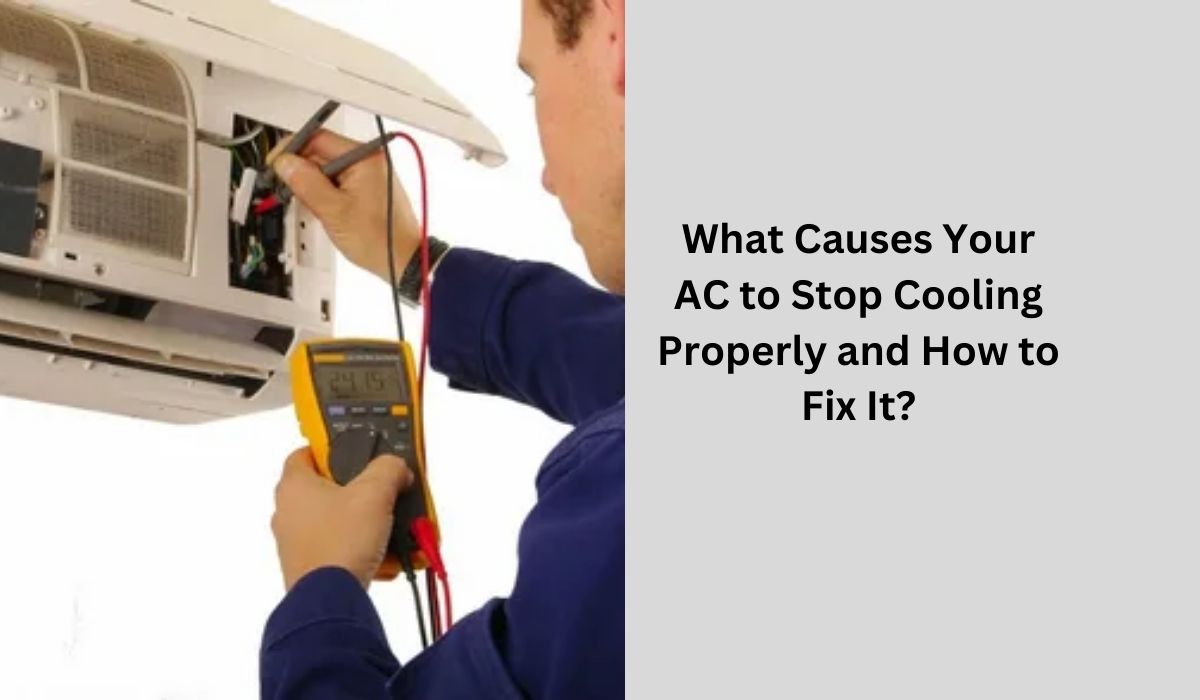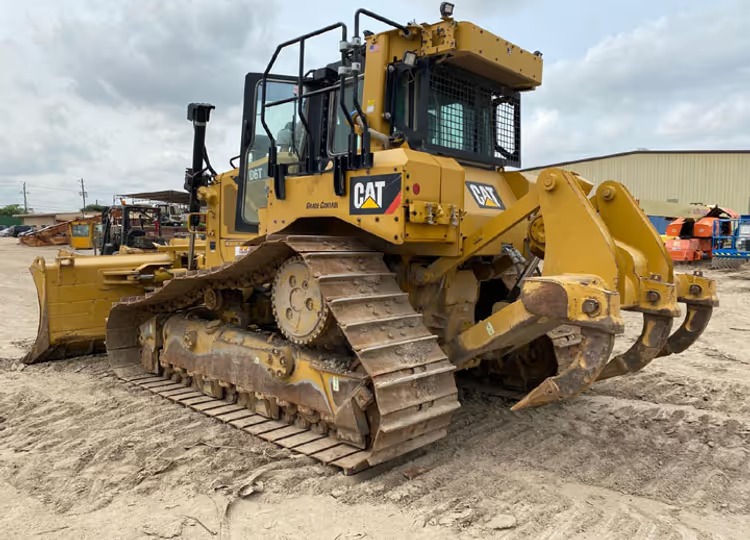As the temperature rises, your air conditioner (AC) becomes your best friend, keeping you cool and comfortable throughout the hot months. But what happens when your AC stops cooling properly? It’s one of the most frustrating issues to deal with, especially in the middle of a heatwave. If you’ve ever faced an AC that blows warm air or simply doesn’t cool your room as effectively as it used to, you’re not alone.
In this blog, we’ll explore the common reasons why your AC may stop cooling properly and provide simple, practical solutions that you can try before calling in a professional. By the end of this guide, you’ll know how to troubleshoot your AC, perform some basic repairs, and get your home feeling cool again.
What Are the Common Reasons Your AC Stops Cooling?
When your air conditioner stops cooling properly, there could be a number of reasons behind it. It’s important to first understand the potential causes, so you can better diagnose the issue and fix it. Here are some of the most common reasons your AC might fail to cool efficiently.
Note: An unreliable AC can be a major hassle, especially during the heat. AC Repair Dubai offers fast and affordable services to restore your system to peak performance. Whether it’s minor repairs or major fixes, you can count on expert technicians. Contact Al Nasaim(النسیم)AC Ducting Dubai for dependable solutions today and ensure your AC is working smoothly.
1. Dirty Air Filters
How Do Dirty Air Filters Affect Your AC?
Air filters are essential for trapping dirt, dust, and debris, preventing them from entering the AC system. Over time, these filters can become clogged with dust and dirt, making it harder for the air to flow through the system. When air can’t circulate properly, your AC struggles to cool the air efficiently.
How to Fix It:
- Turn off your AC and locate the air filter. This is usually behind the front panel or inside the air handler unit.
- Remove the filter and check for dirt or blockages.
- Clean or replace the filter. If it’s reusable, simply rinse it under cold water and allow it to dry completely before putting it back. If it’s disposable, replace it with a new one.
Changing your air filter every 1-3 months can help keep your AC running smoothly.
2. Low Refrigerant Levels
How Does Low Refrigerant Impact Cooling?
Refrigerant is the substance inside your AC that absorbs heat and cools the air. If your AC has a refrigerant leak or runs low on refrigerant, it won’t be able to cool the air properly. This issue can occur over time, especially if your AC hasn’t been serviced in a while.
How to Fix It:
- Check for a leak: Unfortunately, if your refrigerant levels are low, it’s usually because of a leak. This isn’t something that can be easily fixed without the help of a professional.
- Call an AC technician: A trained professional can check for leaks, recharge the refrigerant, and ensure your AC is back to normal.
3. Dirty Coils (Evaporator and Condenser)
Why Are Clean Coils Important?
Both the evaporator and condenser coils in your AC system are responsible for absorbing and releasing heat. Over time, dirt and debris can build up on these coils, reducing their ability to absorb heat and cool the air. If the coils are too dirty, your AC will struggle to cool your home effectively.
How to Fix It:
- Turn off your AC and allow it to cool down.
- Clean the coils: You can clean the coils using a soft brush or vacuum to remove dirt. If they are heavily soiled, it’s a good idea to call a professional to clean them thoroughly.
Regular maintenance, including cleaning the coils, can improve the efficiency of your AC.

4. Faulty Thermostat
How Does a Faulty Thermostat Affect Cooling?
The thermostat is the device that controls the temperature of your home by signaling the AC to turn on or off. If the thermostat is faulty or improperly calibrated, it may fail to accurately sense the temperature, causing your AC to blow warm air or not cool the room as expected.
How to Fix It:
- Check the settings: Make sure the thermostat is set to the correct temperature and cooling mode.
- Replace the batteries: If your thermostat is battery-powered, replace the batteries.
- Recalibrate or replace: If the thermostat is still malfunctioning, it may need to be recalibrated or replaced. You can consult an HVAC technician to assist with this.
5. Blocked or Leaky Ducts
How Do Blocked or Leaky Ducts Affect Cooling?
The ducts in your home are responsible for transporting cool air from the AC throughout your living space. If these ducts are blocked, cracked, or leaking, the cool air will not reach its intended destination, and your home may feel warmer than it should.
How to Fix It:
- Check for visible leaks: Look for any holes, cracks, or gaps in the ducts and seal them with duct tape or a specialized sealant.
- Clear blockages: If you notice any visible blockages in the ducts, remove them carefully to restore proper airflow.
- Call an expert: If you’re unable to locate the issue or need help fixing the ducts, it’s best to contact a professional HVAC technician who can properly seal and clean the ductwork.
6. Frozen Evaporator Coil
What Causes the Evaporator Coil to Freeze?
The evaporator coil is responsible for absorbing heat from the air. If your AC is running low on refrigerant or has airflow problems, the evaporator coil can freeze. When the coil is frozen, it can’t properly absorb heat, leading to warm air blowing from your AC.
How to Fix It:
- Turn off the AC: Allow the coil to thaw out completely, which could take several hours.
- Check the air filter: If the air filter is clogged, replace or clean it to restore proper airflow.
- Fix refrigerant issues: If the coil keeps freezing, there may be an issue with the refrigerant levels or other components. In this case, you should call an AC technician to inspect and repair the system.
7. Overheating or Electrical Issues
How Can Overheating or Electrical Problems Affect Your AC?
Overheating or electrical issues can cause the components of your AC system to malfunction, including the compressor and fan. Without proper operation of these components, the system may struggle to cool your home effectively.
How to Fix It:
- Check the circuit breaker: Make sure the AC is receiving power by checking the circuit breaker. If the breaker is tripped, reset it and see if the AC starts working again.
- Inspect the electrical components: If the system continues to malfunction, you may have a problem with the wiring or electrical components. In this case, it’s best to call an electrician or HVAC professional to diagnose and fix the problem.
8. Improper AC Size
Can the Size of Your AC Affect Its Cooling?
If your air conditioner is too small for the space it’s trying to cool, it won’t be able to cool the room effectively. Similarly, if the AC is too large, it may short-cycle, turning on and off too frequently without fully cooling the room.
How to Fix It:
- Consult an HVAC professional: If you think your AC is too small or large for your space, a professional can perform a load calculation to determine the correct size for your home. Based on this calculation, you may need to replace the unit.
9. Incorrect Installation
How Does Poor Installation Affect Your AC?
If your AC system was installed incorrectly, it may not operate as efficiently as it should. Issues such as improper ductwork, incorrect refrigerant charge, or poor placement of the unit can all contribute to a cooling problem.
How to Fix It:
- Call an expert: If you suspect that your AC wasn’t installed correctly, it’s best to contact the company that installed it or another HVAC professional to inspect and correct the installation.
How to Prevent Your AC from Stopping Cooling?
While fixing an AC that’s no longer cooling properly is essential, prevention is always better than cure. Here are some tips to keep your AC running efficiently year-round.
1. Schedule Regular Maintenance
One of the best ways to prevent cooling issues is by scheduling regular maintenance with an HVAC professional. Annual tune-ups can help catch minor issues before they become big problems.
2. Clean the Filters and Coils Frequently
Cleaning your AC’s air filters and coils every 1-3 months will ensure optimal performance. This simple maintenance step can prevent a host of cooling problems.
3. Use Your Thermostat Wisely
Make sure your thermostat is properly set and avoid turning the temperature too low. Overworking your AC can cause unnecessary strain on the system.
4. Ensure Proper Insulation
Proper insulation in your home helps maintain the cool air produced by your AC, making it easier for the unit to work efficiently.
Conclusion
If your AC is not cooling properly, it can be due to a variety of reasons, from dirty filters to refrigerant leaks. Luckily, many of these issues can be resolved with simple fixes, like cleaning or replacing parts, sealing ducts, or calling a professional for more complex problems. By regularly maintaining your AC and staying on top of minor issues, you can ensure that it runs efficiently all year round, keeping you cool and comfortable when you need it most.
Remember, if you’re unsure or uncomfortable with any of the steps mentioned here, it’s always a good idea to call an HVAC technician. They can accurately diagnose and repair the problem, ensuring your AC is back to cooling at full capacity.
For More Insightful Articles Related To This Topic, Feel Free To Visit: viewsparrow.










